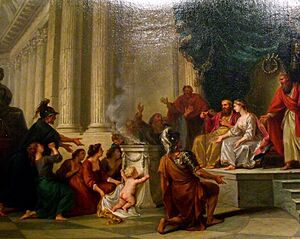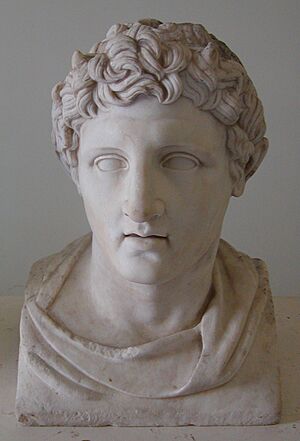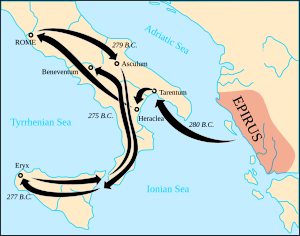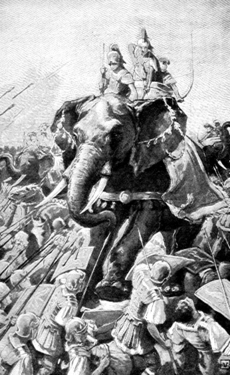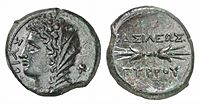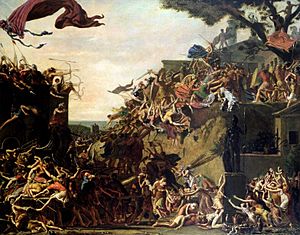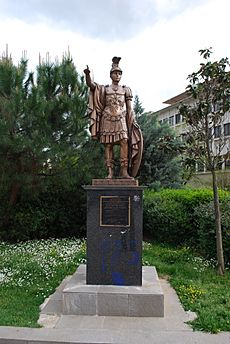Pyrrhus of Epirus facts for kids
Quick facts for kids Pyrrhus |
|
|---|---|
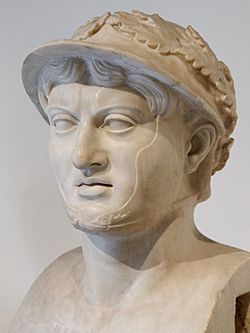
A marble bust of Pyrrhus from the Villa of the Papyri at the Roman site of Herculaneum, now in the National Archaeological Museum of Naples, Italy
|
|
| King of Epirus | |
| Reign | 297–272 BC (second reign) |
| Predecessor | Neoptolemus II |
| Successor | Alexander II |
| Reign | 307–302 BC (first reign) |
| Predecessor | Alcetas II |
| Successor | Neoptolemus II |
| King of Macedonia | |
| Reign | 274–272 BC |
| Predecessor | Antigonus II |
| Successor | Antigonus II |
| Reign | 288–285 BC |
| Predecessor | Demetrius I |
| Successor | Antigonus II |
| Tyrant of Syracuse | |
| Reign | 278–276 BC |
| Predecessor | Thinion & Sosistratus |
| Successor | Hiero II |
| Born | c. 319 BC Epirus, Greece |
| Died | 272 BC (aged about 46) Argos, Peloponnese, Greece |
| Spouse |
|
| Issue |
|
| Dynasty | Aeacidae |
| Father | Aeacides |
| Mother | Phthia |
| Religion | Hellenism |
| Military career | |
| Battles/wars |
|
Pyrrhus (born around 319 BC, died 272 BC) was a famous Greek king and leader from the Hellenistic period. He was king of Epirus, a region in ancient Greece. Pyrrhus was known as one of the greatest generals of his time.
He was a strong enemy of early Rome. Some of his victories cost him so many soldiers that the phrase "Pyrrhic victory" was created. This term means a win that comes with such a huge loss that it feels like a defeat.
Pyrrhus first became king of Epirus when he was just 13 years old. He was later removed from power but regained his throne in 297 BC. He fought against Rome in what is known as the Pyrrhic War. He won battles like Heraclea and Asculum, but with heavy losses. He also tried to take over Sicily from Carthage but was eventually forced out. He lost his gains in Italy after the Battle of Beneventum in 275 BC.
Pyrrhus also took the throne of Macedonia in 274 BC. He later invaded the Peloponnese in 272 BC. During a street battle in Argos, Pyrrhus was killed.
Contents
Pyrrhus: A King and General
What Does the Name Pyrrhus Mean?
The name Pyrrhus comes from the Greek word Pyrrhos. It means "flame-like" or "fiery." It was also used to describe someone with red hair. Pyrrhos was another name for Neoptolemus, a son of the famous hero Achilles in Greek mythology.
Pyrrhus's Early Life

Pyrrhus was born around 319 BC. His father was Prince Aeacides of Epirus, and his mother was Phthia, a noblewoman. Pyrrhus was a second cousin to Alexander the Great. He had two sisters, Deidamia and Troias.
When Pyrrhus was two years old, his father, King Aeacides, was removed from power. This happened because his soldiers rebelled. Pyrrhus and his family had to flee and found safety with King Glaucias of the Illyrian tribe called the Taulantians. Pyrrhus was raised by Glaucias's wife, Beroea.
Later, Pyrrhus's father tried to regain his throne but was defeated and died.
Pyrrhus's First Time as King
In 307 BC, King Glaucias helped Pyrrhus become king of Epirus. Pyrrhus was only eleven years old at the time. So, other people ruled for him until he was old enough.
When he was seventeen, Pyrrhus left Epirus to attend a wedding. While he was away, the people of Epirus rebelled. They removed Pyrrhus's supporters and brought back the previous king, Neoptolemus. Glaucias could not help Pyrrhus this time.
Pyrrhus in Exile
Pyrrhus then went to the Peloponnese region of Greece. He joined his brother-in-law, Demetrius Poliorcetes, who was fighting against another king named Cassander.
The Battle of Ipsus
In 302 BC, Demetrius took his army to Asia Minor. Pyrrhus went with him. There, they joined Demetrius's father, Antigonus Monophthalmus. Pyrrhus greatly impressed Antigonus, who believed Pyrrhus would become a great general.
The other powerful leaders, Seleucus, Lysimachus, Ptolemy, and Cassander, joined forces against Antigonus. They met at the Battle of Ipsus in Phrygia. This was a very large and important battle. Pyrrhus fought bravely, but Antigonus lost the battle and his life. Demetrius escaped, and Pyrrhus continued to serve him.
Help from Ptolemy
In 298 BC, Pyrrhus was sent to Alexandria as a hostage as part of a peace deal. While there, he married Antigone, the stepdaughter of King Ptolemy I Soter. In 297 BC, Ptolemy decided to help Pyrrhus get his kingdom back. He gave Pyrrhus soldiers and money and sent him back to Epirus.
Pyrrhus's Second Reign
Pyrrhus returned to Epirus with an army. He agreed to rule Epirus together with Neoptolemus. However, both kings soon began to plot against each other. Pyrrhus learned that Neoptolemus was planning to kill him. So, Pyrrhus acted first and had Neoptolemus killed. The people of Epirus seemed to support Pyrrhus in this action.
In 295 BC, Pyrrhus moved his capital city to Ambracia. He later went to war against his former ally, Demetrius. Pyrrhus invaded Thessaly while Demetrius was busy fighting elsewhere. Demetrius quickly returned, and Pyrrhus, being outnumbered, went back to Epirus.
Pyrrhus faced another challenge when his second wife, Lanassa, left him. She took her wealth and went to Corcyra, offering herself and her dowry to Demetrius. Demetrius accepted and took control of Corcyra.
Demetrius then planned to invade Epirus. He first attacked Pyrrhus's allies, the Aetolian League. Meanwhile, Pyrrhus marched to help his allies. The two armies passed each other on different roads. Demetrius began to plunder Epirus, while Pyrrhus met Demetrius's general, Pantauchus, in battle.
Pyrrhus's army was larger than Pantauchus's. The fighting was fierce. Pyrrhus and Pantauchus fought each other in single combat. Pyrrhus was wounded but also wounded Pantauchus twice. Pyrrhus's victory encouraged his soldiers, who then defeated Pantauchus's army. They captured 5,000 prisoners. The army honored Pyrrhus by calling him 'Eagle'. When Demetrius heard of Pyrrhus's victory, he returned to Macedonia.
In 289 BC, Pyrrhus learned that Demetrius was very ill. He invaded Macedonia, intending to raid and take loot. Since Demetrius was too sick to lead his army, Pyrrhus met almost no resistance. He reached the old Macedonian capital, Aegae. When Demetrius recovered, Pyrrhus had to retreat because Demetrius had a larger army.
Demetrius then planned to invade Asia. He made peace with Pyrrhus, giving him some land in Macedonia. However, other kings allied against Demetrius. They asked Pyrrhus to join them. Pyrrhus decided to join the allies.
In 288 BC, the allied kings attacked Demetrius. Pyrrhus invaded southern Macedonia. Demetrius's army, tired of his rule, deserted him and joined Pyrrhus. Demetrius had to flee. Pyrrhus and Lysimachus, another allied king, decided to share control of Macedonia.
Demetrius gathered a new army and attacked Athens. The Athenians asked Pyrrhus for help. Pyrrhus marched against Demetrius, who then stopped his attack on Athens. The Athenians thanked Pyrrhus but did not let his army enter their city. Pyrrhus advised them never to let a king's army enter their city again.
Pyrrhus and Demetrius made peace again, but it did not last. In 286 BC, Demetrius invaded Asia. Lysimachus asked Pyrrhus to attack Demetrius's forces in Greece. Pyrrhus agreed and quickly defeated Demetrius's son, Antigonus Gonatas. Pyrrhus now ruled a larger Epirus, half of Macedonia, and Thessaly.
In 285 BC, Demetrius was defeated. Lysimachus then decided to remove Pyrrhus from Macedonia. He turned Pyrrhus's allies against him. In 284 BC, Lysimachus invaded Pyrrhus's part of Macedonia with a huge army. Pyrrhus had to retreat to Epirus as his Macedonian troops turned against him. Lysimachus then invaded and plundered Epirus.
Fighting Against Rome
The Greek city of Tarentum in southern Italy had problems with Rome. Rome had broken an old agreement by sending warships into the Tarentine Gulf. In 282 BC, the Romans placed soldiers in Greek cities nearby. The Tarentines attacked the Romans and sank some of their warships.
Tarentum faced a Roman attack and asked Pyrrhus for help. Pyrrhus saw a chance to create his own empire in Italy. He made an alliance with King Ptolemy Keraunos of Macedonia. Pyrrhus arrived in Italy in 280 BC.
Pyrrhus entered Italy with a large army, including 20,000 foot soldiers, 3,000 horsemen, and 20 war elephants. The elephants were a gift from Ptolemy II Philadelphus.
Pyrrhus defeated the Romans at the Battle of Heraclea in 280 BC. He had better cavalry, elephants, and his strong phalanx formation. After this victory, several Italian tribes and Greek cities joined Pyrrhus. He offered Rome a peace treaty, but they refused. Pyrrhus tried to take more land from the Romans and even marched on Rome itself, but its defenses were too strong. He then returned to Tarentum for the winter.
In 279 BC, Pyrrhus invaded Apulia. He met the Roman army at the Battle of Asculum. Pyrrhus won, but it was a very costly victory. The Romans lost 6,000 men, and Pyrrhus lost 3,500, including many of his best officers. After the battle, Pyrrhus famously said, "If we are victorious in one more battle with the Romans, we shall be utterly ruined." This is where the term "Pyrrhic victory" comes from.
Ruler of Sicily
In 278 BC, Pyrrhus received two offers. Greek cities in Sicily asked him to drive out Carthage, another major power. At the same time, the Macedonians asked him to become their king. Pyrrhus decided Sicily offered a better chance.
He sailed to Sicily and quickly ended the Carthaginian siege of Syracuse. Pyrrhus was declared king of Sicily. He even made plans for his sons to inherit his new kingdoms. In 277 BC, Pyrrhus captured Eryx, the strongest Carthaginian fortress in Sicily. This caused other Carthaginian-controlled cities to join Pyrrhus.
In 276 BC, Pyrrhus tried to make peace with Carthage. He demanded that Carthage leave all of Sicily. However, the Greek cities in Sicily did not want peace because Carthage still held a strong fortress. Pyrrhus agreed with them and broke off the talks.
Pyrrhus then began to besiege Lilybaeum. After two months of failed attacks, he realized he needed a strong fleet to block the city from the sea. He asked the Sicilians for money and men to build ships. When they became unhappy about this, he used force to make them contribute. He even declared himself a military dictator of Sicily.
These actions made the Sicilians very angry with him. They became willing to work with the Carthaginians. Pyrrhus defeated another Carthaginian army, but the Sicilians remained hostile. Pyrrhus began to think about leaving Sicily.
At this point, messengers from Italy told him that only Tarentum was still free from Rome. Pyrrhus decided to leave Sicily. As his ship left the island, he said, "What a wrestling ground we are leaving, my friends, for the Carthaginians and the Romans." This was a prediction of the future Punic Wars. While his army sailed to Italy, Pyrrhus's navy was mostly destroyed by the Carthaginians.
-
Coin of Pyrrhus minted at Syracuse, 278 BC. Obverse: Veiled head of Phtia with oak wreath, caption ΦΘΙΑΣ (of Phtia). Reverse: Thunderbolt, ΒΑΣΙΛΕΩΣ ΠΥΡΡΟΥ (of King Pyrrhus).
Retreat from Italy
- Further information: Battle of Beneventum (275 BC)
While Pyrrhus was in Sicily, the Romans rebuilt their army. Near today's Benevento, one of the Roman leaders, Manius Curius Dentatus, had set up camp. Pyrrhus tried to surprise him with a night attack. However, the thick plants in the area slowed his men down. They arrived at daylight, tired and easily seen.
The attack failed, and Pyrrhus lost half of his elephants. The next day, the Romans attacked. Pyrrhus's cunning and his soldiers' strong resistance stopped the first Roman attack. But a second wave of Romans scared the elephants, possibly with flaming arrows. The elephants ran into Pyrrhus's own army, causing chaos. Pyrrhus had to retreat from the battle.
After this battle, Pyrrhus decided to end his campaign in Italy. He returned to Epirus, losing almost all the land he had gained in Italy. Only the city of Tarentum remained under his control.
Last Wars and Death
Pyrrhus's wars in the west had cost him many soldiers and a lot of money. Despite this, Pyrrhus went to war again. His next target was the kingdom of his rival, Antigonus Gonatas of Macedonia. Pyrrhus gathered an army and marched into Macedonia. He won an easy victory at the Battle of the Aous and took most of Macedonia.
Antigonus held onto some coastal cities. Pyrrhus became unpopular in Macedonia because he allowed his Gallic soldiers to rob the tombs of Macedonian kings.
In 272 BC, a Spartan named Cleonymus asked Pyrrhus to attack Sparta and help him gain power. Pyrrhus agreed, hoping to control the Peloponnese region himself. However, the Spartans put up a strong fight, and Pyrrhus's attack on Sparta failed. During his retreat, he lost his oldest son, Ptolemy, who was leading the rearguard.
Pyrrhus soon had another chance to fight in a dispute in Argos. Antigonus Gonatas was also approaching. Pyrrhus tried to enter Argos secretly with his army, but the city was full of enemy troops. During a confused street battle in the narrow city streets, Pyrrhus was trapped. An Argive soldier's old mother, watching from a rooftop, threw a tile. It hit Pyrrhus, knocking him off his horse and breaking his spine, which paralyzed him. A Macedonian soldier then beheaded him.
Antigonus honored Pyrrhus by cremating his body and sending his surviving son, Helenus, back to Epirus. That same year, Tarentum surrendered to Rome after hearing of Pyrrhus's death.
Pyrrhus's Legacy
In his book about Pyrrhus, Plutarch wrote that Hannibal, another great general, considered Pyrrhus one of the greatest commanders ever. Pyrrhus was a brilliant military leader, but he sometimes struggled to stay focused and manage his kingdom's money.
The idea that a king's touch could heal diseases might have started with Pyrrhus. Pliny the Elder wrote that Pyrrhus's big toe on his right foot could cure spleen diseases just by touching the patient. His toe also could not be burned. When his body was cremated, his toe was saved in a special box and kept in a temple.
Pyrrhus's name is remembered in the term "Pyrrhic victory". This comes from his famous quote after the Battle of Asculum: "If we are victorious in one more battle with the Romans, we shall be utterly ruined." A Pyrrhic victory means a win that costs so much that it feels like a loss.
Pyrrhus's campaign in Italy was a chance for the Greek world to stop Rome from expanding. His failure to fully use this chance had huge effects. Rome's conquest of the Greek cities in Italy led to direct competition with Carthage, starting the Punic Wars. Rome's victory in these wars helped it become one of the most powerful states in the Mediterranean.
Over the next century, the Greek kingdoms and city-states did not unite against Rome. This led to them being taken over by the Roman Empire or becoming Roman client states. By 197 BC, Macedonia and many Greek city-states were under Roman control. Eventually, Rome took over all of Greece and much of Asia Minor.
Pyrrhus wrote books about the art of war, but these have been lost. However, they were praised by famous figures like Hannibal and Cicero.
Pyrrhus was married five times and had several children. His first wife, Antigone, gave birth to his daughter Olympias and his son Ptolemy. His second wife, Lanassa, had two sons, Alexander and Helenus. He also married the daughter of the King of Paeonia, an Illyrian princess named Bircenna, and the daughter of Ptolemy Keraunos.
See also
 In Spanish: Pirro de Epiro para niños
In Spanish: Pirro de Epiro para niños
 | Audre Lorde |
 | John Berry Meachum |
 | Ferdinand Lee Barnett |


